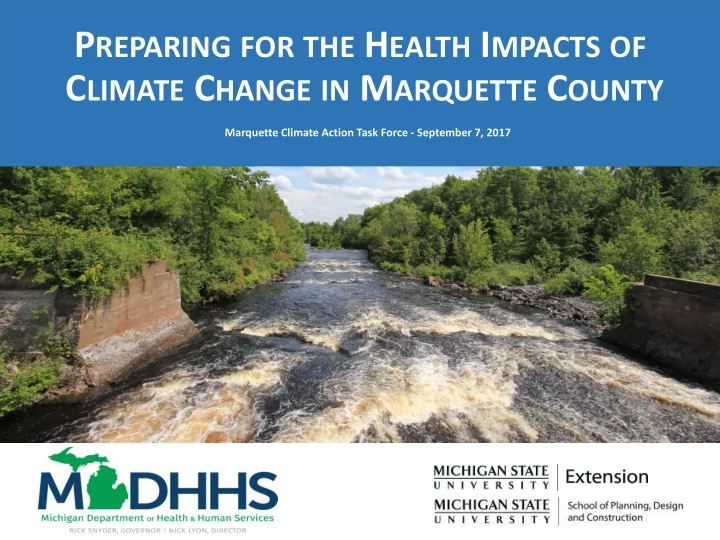

P REPARING FOR THE H EALTH I MPACTS OF C LIMATE C HANGE IN M ARQUETTE C OUNTY Marquette Climate Action Task Force - September 7, 2017
Acknowledgments Michigan Climate and Health Adaptation Program (MICHAP) Michigan Dept. Health & Human Services (MDHHS) Lorri Cameron, Aaron Ferguson, Yonathan Kefelegn Michigan State University Brad Neumann, MSU Extension Pat Crawford and Wayne Beyea, MSU School of Planning, Design, and Construction Photo: MSU SPDC
Outline Project Overview Climate and Health Priorities The Response Next Steps Photo: MSU SPDC
Project Overview 4
Brief Summary Where: Multiple sites across Who: Project Team (MICHAP, MSU, MCHD) Marquette County Advisors & Stakeholders (CATF, Why: Significant existing Community, Vulnerable Pop.) adaptive capacity. Climate driven events have impacted What: Build community capacity to address and health and quality of life, interrupt climate change from particularly for vulnerable impacting health. groups. When: ‘16 - ’17 Planning & How: Climate and Health Engagement/‘17 - ’18 Developing Adaptation Guidebook & Feedback/’18 -tbd Rollout & Implementation
What we need from CATF • FEEDBACK on our process and product (Advisory group) • SUPPORT for implementing our intervention • COORDINATION with other CATF activities
Marquette’s Climate and Health Priorities
Stakeholders Climate Change Local Government • • Superior Watershed Partnership Marquette County • • Climate Reality Project City of Marquette • • MSU Extension – Greening MI Institute Marquette Twp. • • CATF Chocolay Twp. • Humboldt Twp. • Sawyer • Area Chambers of Commerce • Public Utilities Health Vulnerable Populations • • Marquette County Health Dept. Alger-Marq. Community Action • • MSU College of Human Medicine – UPHS Aging Services • • MSU Extension – Health & Nutrition Inst. Veterans Affairs • • NMU – Community Health Education Homeless & Shelter Services • • Area Physicians Continuum of Care • Emergency Response Officials
What We Heard Climate Change • Things changing are upsetting to many – mental health is also a concern. • Wildfires and floods can prevent food from being trucked in. Local Government • Sands Township aquifer has been depleting rapidly. • Communities are vulnerable to flooding due to aging infrastructure. Still have wood water lines. Health • There were a lot of respiratory illnesses in ER and clinic last spring and summer. People were sicker and stayed longer. • Big storm surges increase runoff and contamination of runoff. Vulnerable Populations • A lot of elderly don’t want to leave their homes during evacuations. • Those in isolation can easily be cut off from services during an extreme weather event.
Stakeholder Input on Priorities Identified Concern Discussion Sessions Primary Priorities Climate Health Climate Public Emergency Local Issues Change Health Preparedness/ Government Water Issues Undeserved Water Quality Wildfires X X Mental Health X X Flooding Vector Borne X X X Water Shortage Diseases Social Conflict X Flooding X X X X Energy X X X Economic Impact X Secondary Priorities Resource X Allocation Water Shortage X X X Ticks Air Quality X X Ticks X X X Wildfires Lake X Contamination Extreme Weather X X Food Access X Extreme Heat X X
Your Thoughts What is your reaction to the Stakeholder Input? Does this reflect your concerns? Anything missing?
The Response: Phase 2 – Process for Moving Forward • Stakeholder Input • Identify key stakeholders and potential partner communities Summer • Plan and convene advisory groups for input and feedback sessions 2017 • Meeting One- Visioning Kick-Off • Feedback from key stakeholders and prioritized concerns Fall • Identify metrics for climate change assessment 2017 • Key themes for intervention design, vulnerability assessment tools • Meeting Two- Preliminary Recommendations • Collect, tabulate and analyze information Winter • Prioritize interventions and metrics for Guidebook 2017 • Present preliminary design and planning recommendations • Meeting Three- Present Final Report • Develop evidence-based evaluation techniques Spring • Draft Guidebook including feedback from stakeholders 2018 • Implementation • Present Guidebook to community stakeholders Summer/Fall • Determine next steps for piloting at least one aspect of the Guidebook 2018
Next Steps Summarize stakeholder input, priorities and potential evaluation techniques. Identify and invite stakeholders and community partners Convene the Kickoff meeting __________________________________________ If you have any questions, contact: Wayne Beyea, beyea@msu.edu; 517-432-7600 14
Recommend
More recommend